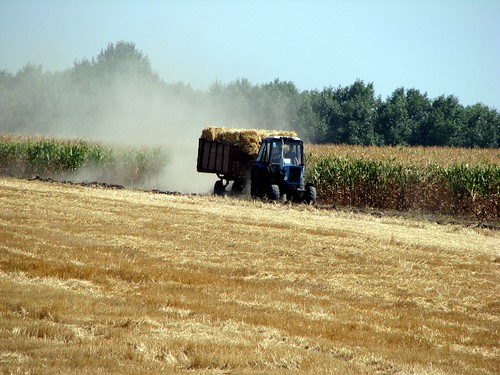
Ukraine
This weekend, The Oil Drum had an article up asking if the world could feed 9 billion people. There was a valuable comment which I'd like to share with readers here by someone named Kiashu. I trust his numbers are correct, though I haven't crunched them myself. The problems in feeding the world, currently, are not food production limitations. They will be if we ever get tight fossil fuel supplies. In the mean time they are related to economics, government agricultural policy, storage, refrigeration, and distribution.
Of course, none of these problems is surmountable, so that means my title for this thread is only theoretical. But, there is also a great deal of slack in the system. When I saw, recently, that 60 percent of the red meat consumed in the world is goat meat, it helped me to envision an efficient, subsistant agricultural life which we are not accustomed to here in America.
Kiashu: We could feed 9 billion people today very well. We could feed 14 billion, in fact. According to the FAO, it was expected that in 2009/10 the world would produce 2,128.8 million tonnes of grain. If this were distributed to 9,000 million people, they'd receive 237 kg each annually. or 650g a day. This is 2,275 kcal.
From the same World Food Outlook, the world also produces some 400 million tonnes of oilseeds - 44 kg annually or about a litre a week per person of the 9 billion. And about 160 million tonnes of sugar - 340g a week each. These add 600 kcal or so daily. Then we produce 100 million tonnes of citrus fruit, 320 million tonnes of potatoes, and so on and so forth. This easily takes it all over 3,000 kcal without eating a single fish or cow. Around half this food is produced with little or no fossil fuel inputs - though heavy labour inputs.
The average adult diet in Australia is about 2,000kcal. People doing manual labour will need more energy, sedentary people, elderly and children less. We have enough food today to feed 14 billion people, so 9 billion certainly wouldn't be difficult. Yet we have people going hungry today with our 6.8 billion. Why? The problems are storage or waste - as mentioned earlier, around a third the rice crop in Asia perishes in storage, here in the West we discard 25-40% our food uneaten - and distribution.
Distribution is key. Of our 2,200Mt grains, some 775Mt - about a third - go to livestock to help give us 285Mt meat and 690Mt milk products, and some 410Mt - about a fifth - goes to biofuels. And while there are some 1,000 million obese people in the West and upper classes of the Third World, there are 800 million or so hungry people. The problem is not how to produce enough food to feed everyone. We do that now, and could feed twice the number we have today. The problem is ensuring that everyone gets a fair share. As Gandhi said, the world has enough for everyone's need, not for everyone's greed.
But as it stands, the problem is distribution, not production.